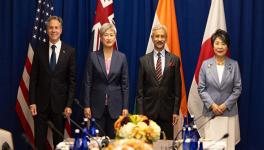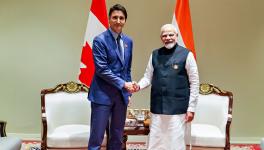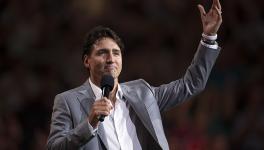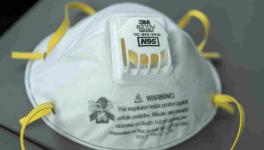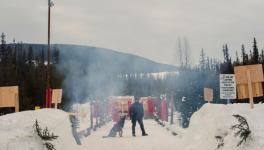Canadian Elections: Laboring the Vote
With the upcoming federal election, several of Canada's prominent unions and labor federations have taken a strong stance against the Harper Conservative government, launching media campaigns to deny a fourth term to the Conservatives, who they consider staunchly anti-union. The Public Service Alliance of Canada's latest campaign to influence the outcome of the elections uses a picture of a bleeding red maple leaf to portray what it says is the Stephen Harper government's relentless assault on federal public services. About 4 million Canadians belong to unions, the public sector far outnumbering the private sector. However, in the last election over 50 percent of unionized households did not vote.
SHARMINI PERIES, EXEC. PRODUCER, TRNN: Welcome to the Real News Network. I'm Sharmini Peries coming to you from Baltimore.
With the upcoming federal election, several of Canada's prominent unions and labor federations have taken a strong stance against the Harper Conservative government, launching media campaigns to deny a fourth term to the Conservatives, who they consider staunchly anti-union. The Public Service Alliance of Canada's latest campaign to influence the outcome of the elections uses a picture of a bleeding red maple leaf to portray what it says is the Stephen Harper government's relentless assault on federal public services. About 4 million Canadians belong to unions, the public sector far outnumbering the private sector. However, in the last election over 50 percent of unionized households did not vote.
With us to understand the issues of labor in the federal election we are joined by two guests: Angella McEwen and David Bush. Angella McEwen is joining us from Toronto. She is a senior economist at the Canadian Labour Congress, and a policy fellow at the Broadbent Institute. And David Bush is joining us from Toronto too, and David is the editor at RankAndFile.ca, a Canadian labor news website. Thank you both for joining us.
ANGELLA MCEWEN: Thanks for having me.
DAVID BUSH: Thank you.
PERIES: Angella, let me start with you. Your take on Stephen Harper's track record on jobs and labor thus far.
MCEWEN: Okay. So I think both in terms of doing what he can to support a strong labor market and to support unions or even just leave them alone, they have a terrible record. So when the Conservatives first, even though this would be their fourth term coming up, if they were to win--they've only had a majority government for the past four years. And as soon as they were elected into a majority situation that first year, they either brought in or threatened to bring in back-to-work legislation three times for Air Canada, once for Canada Post, and once for CP Rail. So they kind of set the tone right away, that they weren't respecting the collective bargaining process. And at one point they legislated pilots back to work before they had even gone on strike.
So that set a real clear tone for what the labor relations were going to be like with this Conservative majority government. Since then they've brought in legislation, either in budget bills or otherwise, that have legislated rather than collectively bargained with their members. So they've changed pensions, they've threatened sick leave. They have introduced private members' bills that make it harder to unionize in the public sector. And that put really onerous reporting requirements on unions that aren't required of any other organizations.
PERIES: So then Dave, let me go to you. What observations have you in terms of the Harper government's record on labor and unions?
BUSH: Yeah. I mean, I think what Angella said is correct, that the attacks on unions really set the tone for the last bunch of years, since 2011. You have to remember, in the context after the great recession, that workers actually felt the brunt of that recession. And the Conservatives helped double down on that by taxing Canada Post, by attacking the teamsters at CP Rail, and Unifor, or then the Canadian Auto Workers and the airlines. It's been an unmitigated disaster.
And we have to also think about the cuts that they have been implementing at the federal public sector. And that's I think disproportionately affected certain regions in the country, like the Maritimes, where you see Conservative support at an all-time low. You also have to think about that they have been cutting programs like employment insurance, which has increased precarity of workers and their ability to fight back. And this is, it's been an unmitigated disaster, and something that labor has to grapple with.
PERIES: All right. Let's take up the opposition parties. Angella, let me go to you. How do they shape up in terms of their stance on the economy and job creation?
MCEWEN: So if you look at the platforms of the other three major parties, so you're looking at the Liberal party, the New Democrats and the Green party, most of them are proposing what we've been asking for from the Conservatives for the past three years. We've been asking for more infrastructure planning to rebuild aging infrastructure and municipalities in First Nations communities. These have been needs that we've had for some time, and the Conservatives have been rushing to balance the budget. So they've been cutting--not only have they not been investing in these things, they've been cutting services, and putting off investments.
So on that front, that's great. The Green party has--a big part of their plan is a carbon tax, and then they're going to use that money to reinvest in other areas. The NDP are raising corporate income taxes and some other taxes in order to invest in infrastructure. And the Liberals are borrowing to invest in infrastructure. So that's the biggest difference, I think, between those three. The Liberals are restoring a little bit to the employment insurance program that David mentioned the Conservatives had cut. The employment insurance program is the single best automatic economic stabilizer that we have. That gets money back into the hands of people when they've been laid off, and in communities when they need it. And right now in Canada, only about 40 percent of unemployed workers are getting EI benefit.
So this is a really serious area that we need to reform. And then the New Democrats have proposed to spend more in order to improve access and benefit levels, to open up sickness benefits and add more parental benefits there. So that's good in terms of stabilizing the economy and something directly that will help workers.
PERIES: And David, given that the Canadian economy is a highly resource-based economy dependent on tar sands and oil and gas production, what do you think of the various different platforms, and who has the most environmentally sound election platform when it comes to jobs and reviving labor unions?
BUSH: Well I mean, it's complicated. Every party wants to position themselves as something different than the Conservatives. You know, the agent of change. And so the Liberals are saying they want to, you know, be sort of a pro-environment party, as opposed to the Conservatives. But they support Keystone XL, and they don't support hard targets in terms of emission reductions. The NDP doesn't support the Keystone XL pipeline going north to south, but it does support the Energy East pipeline. And this is, I think, a problem when we look at the union movement itself, which is actually divided over some of these questions. And therefore our ability to as a labor movement, to put pressure on positive change, I think it's complicated.
The Green party itself also has criticized the Liberals and the NDP for their positions on pipelines, but its platform is pretty indistinguishable from the NDP's in terms of supporting pipelines if they get, meet the requirements, or approvals. So in terms of east-west pipelines. In terms of actual infrastructure development we see that Liberals, the NDP, and the Green party all plan on spending money to increase infrastructure spending, and that's a good thing. But how that money gets spent, where it gets spent, and what it gets spent on is an interesting question, and I think a little fuzzy for some of those parties.
So Unifor itself released a study, or a platform, in 2013 about getting our rail infrastructure back up to steam, and then implementing high-speed rail in the Southwestern Ontario corridor. And this would be a positive example of green infrastructure spending that would create jobs and solve some of our traffic problems, and also our environmental problems. And I have not seen a party, for instance, mention that. And I think that, that's where this sort of conversation needs to go, either now, but also after the election. Where are we going to put this money?
PERIES: And Angela, I should ask you, has the Canadian Labour Congress taken a position like some of the other unions when it comes to who the Canadian Labour family should be voting for?
MCEWEN: No. What the Canadian Labour Congress has done in this election, and I think in the previous election, was that we've identified issue areas that we think are important for workers. And we have developed some fact sheets, we've developed some background information, and those are--that's around childcare, healthcare, retirement security, and good jobs. And so we think these are good information for voters to have when they go to the polls. They can maybe help them know what we're asking for from the parties on each of these areas.
We think that childcare helps women's equality and labor force participation helps even the playing field for kids. We think that retirement security, 11 million Canadians don't have a workplace pension, and so ask your MP or ask your candidate when they come to the door, what is their party going to do about retirement security for the baby boomers, when they're retiring. And for kids that are entering the workforce now, that aren't getting workplace pensions. So that's an intergenerational equity issue. And we're saying healthcare is crucial. We need to put more resources into healthcare, and the federal government needs to step up and play more of a role in healthcare than they have under the Conservative government.
And then under good jobs we're saying we need to be doing this green transition that David is talking about. We need to be investing in a new economy. It can't be the environment versus jobs. We have to be thinking about what kind of infrastructure can we put into place that will help us transition to a cleaner economy, public transit in urban areas, high-speed rail. We can be looking at retrofitting houses to make them more energy efficient. We can be looking at clean tech, how do we incentivize more clean tech research and business in Canada? So that type of thing, how are we--how are we positioning ourselves for the economy of the future, for a green economy, and a healthier economy. And always, my personal thing is employment insurance. So how can we make sure that that is working for workers, and that the social safety net is in place for people when they need it.
PERIES: David, the last word to you. In terms of where Rank And File stands in terms of the election, are you supporting any specific party? And what are you advising Canadians?
BUSH: I think, you know, in terms of RankAndFile.ca's editorial position we don't actually have one on the election in terms of supporting a party. What we think, most importantly, is how will we as a labor movement going to move forward after this election? And which demands and priorities are we going to put on any government that comes into power? Because we have to be able to set the agenda come October 20 in favor of labor. That means putting real pressure on whatever government comes into power to make EI better, repeal anti-union bills 377 and 525, and implement a $15 minimum wage at the federal level, and things like this. And that actually requires us as a movement to think--we've been so obsessed with defeating Harper at the ballot box, as we should, that we actually now need to redouble our efforts into building those social movements that actually can create the change that we need from the bottom up.
PERIES: Angella and David, both, thank you so much for joining us today.
BUSH: Thank you.
MCEWEN: Thank you.
PERIES: And thank you for joining us on the Real News Network.
End
DISCLAIMER: Please note that transcripts for The Real News Network are typed from a recording of the program. TRNN cannot guarantee their complete accuracy.
Courtesy : The Real News Network
Get the latest reports & analysis with people's perspective on Protests, movements & deep analytical videos, discussions of the current affairs in your Telegram app. Subscribe to NewsClick's Telegram channel & get Real-Time updates on stories, as they get published on our website.










